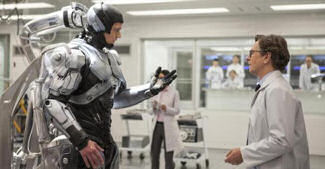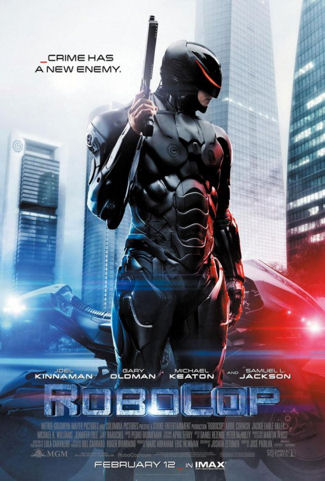|
Robocop
For his first English-language film, Brazilian director José Padilha made a bold move in remaking Paul Verhoeven’s 1987 cult classic Robocop. This had fans of the original rolling their eyes and confirmed to moviegoers that tirelessly complaint that the Hollywood thinktank is barren. Remakes have been commonplace in cinema for decades, and even though some movies are considered just fine on their own, I would still prefer for only lousy or mediocre movies (with good concepts) to be remade.
But I was willing to give Padilha the benefit of the doubt due to his excellent crime films, Elite Squad and Elite Squad: Enemy Within. If you haven’t seen those, check them out and you’ll see why he could be a good choice to offer a fresh look at a cyborg police officer in a dystopian future Detroit.
It’s 2028, and global conglomerate OmniCorp has developed a way for our soldiers to stay at home with their families, while their robotic creations protect the world overseas. We see their robot soldiers, programmed from afar, walk alongside giant two-legged automatic turrets on a busy street somewhere in the Middle East (of course), while drone planes soar, monitoring activity and keeping terrorists at bay. Again, the selling point here is, your loved one will never have to step onto a war zone. Those days are done. That’s what Pat Novak (Samuel L. Jackson), host of The Novak Report, wants you to believe as well. The popular charismatic pundit – a FoxNews/CNN mouthpiece hybrid – is outspoken in his support of mechanized protectors and crime prevention and wonders why Americans won’t accept on their own soil what is clearly working overseas. That’s because legislation in the States have implemented the Dreyfuss Act, an anti-robot bill that has swayed public opinion.
 OmniCorp CEO, Raymond Sellars (Michael Keaton) knows that in order to have police departments across the nation utilize his product, the American people need to be won over. They need to be able to trust or somehow relate to these robotic defenders, which means humanizing them. The heads of OmniCorp marketing (led by a weasely Jay Baruchel) and legal (Jennifer Ehle) are on it, drawing up poll results, stats and contracts, while Sellars taps the medical expertise of scientist Dr. Dennett Norton (Gary Oldman, spot-on as always) to pitch the idea of fusing his current robotics with a human. OmniCorp CEO, Raymond Sellars (Michael Keaton) knows that in order to have police departments across the nation utilize his product, the American people need to be won over. They need to be able to trust or somehow relate to these robotic defenders, which means humanizing them. The heads of OmniCorp marketing (led by a weasely Jay Baruchel) and legal (Jennifer Ehle) are on it, drawing up poll results, stats and contracts, while Sellars taps the medical expertise of scientist Dr. Dennett Norton (Gary Oldman, spot-on as always) to pitch the idea of fusing his current robotics with a human.
Norton, a specialist in restoring functionality to amputees is hesitant at first, but is won over by the challenge and soon everyone involved begins the process of finding an ideal candidate. That would be Detroit police detective Alex Murphy (Joel Kinnaman), who recently survived a car bomb assassination attempt by local crime boss Antoine Vallon (Patrick Garrow). That is, if you consider someone who is only left with his head, lungs and one hand as “surviving”. But, that’s exactly what Norton and his team can work with.
It also helps that Alex has no anger issues and has an incorruptible disposition, making him the right psychological profile as well. In fact, he and his partner Officer Lewis (an underused Michael K. Williams), had uncovered some major police corruption right before he was blown to bits, making that attempt on his life anything but coincidental.
 After some persuasion, Alex’s reluctant wife Clara (Abbie Cornish) signs off his parts to OmniCorp, who in turn transform him into a super-strong cyborg nicknamed RoboCop. There is initial shock as Alex sees what he’s become, which is then followed by expected denial. After some persuasion, Alex’s reluctant wife Clara (Abbie Cornish) signs off his parts to OmniCorp, who in turn transform him into a super-strong cyborg nicknamed RoboCop. There is initial shock as Alex sees what he’s become, which is then followed by expected denial.
It’s obvious we’re delving into more indepth examination with this “RoboCop” Alex is soon put through a series of tests and training, monitored by Norton and Sellars and implemented by embittered OmniCorp robot wrangler Mattox (Jackie Earle Haley), who calls Alex “Tin Man” and has doubts about this new robot with a supposed conscience. Mattox believes that a man fused with robotics will never be as effective as a man controlling a robot.
He may be on to something there as Alex begins to show unpredictable behavior that fights his programming. He starts to revisit his police corruption investigation and seek out those who destroyed his life, sending Norton scrambling to tweak his wiring even further away from his human side. As Sellars prevents Alex’s wife and son David (John Paul Rutton) from seeing him, Alex begins to realize that the ones who “saved” his life, weren’t necessarily altruistic. Seeking both freedom and justice, Alex sets out to expose the lies and manipulation he and his family have been mired in and it may cost him his life yet again.
 There are noticeable and inevitable differences between the two versions of Robocop, which is both good and bad. Although I’m not always fond of comparing remakes to originals, in this case it helps in figuring out what works and what doesn’t in this 2014 update. There are noticeable and inevitable differences between the two versions of Robocop, which is both good and bad. Although I’m not always fond of comparing remakes to originals, in this case it helps in figuring out what works and what doesn’t in this 2014 update.
Sure the CGI is better, offering more fluid movements and a sleeker design scheme for the RoboCop suit, but that actually touches on one of the movie’s biggest problems. This RoboCop is too human. He’s more Cop than he is Robo.
What resonated the most about the original (and yes, despite it’s insane mix of bold humor and bloody violence, it connected with the audience) was seeing how RoboCop slowly realizes who he is – something that Peter Weller did so well – eventually regaining control of his humanity and his new body. That’s not what happens here.
This new movie finds Joel Kinnaman’s Alex Murphy fully aware of what he’s become right from the start. On an emotional and mental level, there are some really good moments during that initial realization. Especially effective is a scene where Oldman’s Norton disassembles all of Alex’s robotic parts, to show him what specific parts he has left apart from his new metal suit.
 It’s a horrific moment, with a twisted and quite beauty that actually solidifies Norton, who ranges from a tormented Gepetto to a tortured Frankenstein, as the unpredictable heart of the movie. It’s a testament to how great Oldman is here and also indicative of the movie’s failure to connect Alex Murphy/RoboCop to viewers. It’s a horrific moment, with a twisted and quite beauty that actually solidifies Norton, who ranges from a tormented Gepetto to a tortured Frankenstein, as the unpredictable heart of the movie. It’s a testament to how great Oldman is here and also indicative of the movie’s failure to connect Alex Murphy/RoboCop to viewers.
Instead of watching Alex lose his humanity to technology, too much time is spent watching him try to reconnect with his family. That’s an unfortunate misstep on the part of first-time screenwriter Joshua Zetumer, since the pre-RoboCop family dynamic set-up was pretty weak and kind of forced.
This results in a scene where Alex visits his family at home, gets down on a robo-knee in front of his son and asks him, “Do you wanna touch it?”, referring to his suit, of course. It’s a moment that just doesn’t work, coming across as silly and awkward.
Another reason why it doesn’t work is because of Kinnaman’s voice – it’s not robotic, which was an element that really made Weller’s great performance in the original. Hearing the man in the suit sound like a robot, sells both the concept and the absence of humanity. But here we have Kinnaman talking to characters like his Detective Holder would some punk kid on the streets in AMC’s The Killing. It’s a wrong move omitting such a subtle yet crucial touch.
RoboCop may not have the comedic satirical punch the original had, but it aims for a less overt approach. Most of the laughs come from Jackson and Keaton, mainly because these are such familiar actors and also because of the fun they have with their roles. These two actors are capable of eliciting laughs and portraying unsettling antagonists. While Jackson’s Bill O’Reilly-type character is more in-your-face in his delivery, Keaton is the opposite, managing to grasp a subtle hold of his signature squirrely body language.
 Particularly funny: seeing the former Batman ask for a black Robo-suit because it looks cooler and it’ll test better (but, we really know why). For a RoboCop movie, I’m spending a good deal of time talking about the characters who do not “suit-up”. That says a lot right there. Particularly funny: seeing the former Batman ask for a black Robo-suit because it looks cooler and it’ll test better (but, we really know why). For a RoboCop movie, I’m spending a good deal of time talking about the characters who do not “suit-up”. That says a lot right there.
The action sequences (let’s face it, that’s what people are expecting) have a handheld approach that’s mostly at close range. This, as you’d expect, makes it difficult to follow what’s happening. Even worse is a pivotal scene where RoboCop tracks down Vallon, which is shot indoors with barely any light. I get it, the goal is to add some realism to the scene, but the audience winds up just missing out.
Speaking of missing out, what RoboCop lacks is a prominent villain. We had it with Kurtwood Smith in the original, a sleazebag urban dealer who offset the smarmy white-collar scumbag played by Ronny Cox. The character of Antoine Vallon should be playing a threatening lowlife here, but his screen time is all but a blip.
One aspect I never would’ve thought I’d be complaining about is the movie’s PG-13 rating. I didn’t arrive at this immediately, but after some thought, I feel like the movie loses a needed visceral shock by not showing the graphic details of Alex Murphy’s decimated body. What Verhoeven did in ‘87 was shockingly unnerving, but Padilha barely shows us anything of Alex after the explosion.
Because of that decision, I feel more for Weller’s Murphy than I do Kinnaman’s Alex because of what I saw Weller go through. I can appreciate something different, but showing the protagonist endure such deplorable violence is much more impacting than having a doctor read off what body parts the character has lost.
Rest assured, RoboCop is a much better movie than the recent Total Recall, the other recent remake of Verhoeven's work, but it could’ve been much better in its own right if it would’ve leaned more in the Robo-direction.
This movie is best seen to get your curiosity scratched and to see some fun performances by Jackson, Keaton and Oldman. I don’t know how that sways you. You may be tired of all these 80s remakes, but they’re not going away anytime soon. Who knows, this movie may connect with that generation of moviegoers who’ve never seen a RoboCop movie before. They’re out there and this could be for them.
This review also appears in slightly different form on David's site, Keeping-It-Reel.com.
|

 OmniCorp CEO, Raymond Sellars (Michael Keaton) knows that in order to have police departments across the nation utilize his product, the American people need to be won over. They need to be able to trust or somehow relate to these robotic defenders, which means humanizing them. The heads of OmniCorp marketing (led by a weasely Jay Baruchel) and legal (Jennifer Ehle) are on it, drawing up poll results, stats and contracts, while Sellars taps the medical expertise of scientist Dr. Dennett Norton (Gary Oldman, spot-on as always) to pitch the idea of fusing his current robotics with a human.
OmniCorp CEO, Raymond Sellars (Michael Keaton) knows that in order to have police departments across the nation utilize his product, the American people need to be won over. They need to be able to trust or somehow relate to these robotic defenders, which means humanizing them. The heads of OmniCorp marketing (led by a weasely Jay Baruchel) and legal (Jennifer Ehle) are on it, drawing up poll results, stats and contracts, while Sellars taps the medical expertise of scientist Dr. Dennett Norton (Gary Oldman, spot-on as always) to pitch the idea of fusing his current robotics with a human. After some persuasion, Alex’s reluctant wife Clara (Abbie Cornish) signs off his parts to OmniCorp, who in turn transform him into a super-strong cyborg nicknamed RoboCop. There is initial shock as Alex sees what he’s become, which is then followed by expected denial.
After some persuasion, Alex’s reluctant wife Clara (Abbie Cornish) signs off his parts to OmniCorp, who in turn transform him into a super-strong cyborg nicknamed RoboCop. There is initial shock as Alex sees what he’s become, which is then followed by expected denial.
 There are noticeable and inevitable differences between the two versions of Robocop, which is both good and bad. Although I’m not always fond of comparing remakes to originals, in this case it helps in figuring out what works and what doesn’t in this 2014 update.
There are noticeable and inevitable differences between the two versions of Robocop, which is both good and bad. Although I’m not always fond of comparing remakes to originals, in this case it helps in figuring out what works and what doesn’t in this 2014 update. It’s a horrific moment, with a twisted and quite beauty that actually solidifies Norton, who ranges from a tormented Gepetto to a tortured Frankenstein, as the unpredictable heart of the movie. It’s a testament to how great Oldman is here and also indicative of the movie’s failure to connect Alex Murphy/RoboCop to viewers.
It’s a horrific moment, with a twisted and quite beauty that actually solidifies Norton, who ranges from a tormented Gepetto to a tortured Frankenstein, as the unpredictable heart of the movie. It’s a testament to how great Oldman is here and also indicative of the movie’s failure to connect Alex Murphy/RoboCop to viewers. Particularly funny: seeing the former Batman ask for a black Robo-suit because it looks cooler and it’ll test better (but, we really know why). For a RoboCop movie, I’m spending a good deal of time talking about the characters who do not “suit-up”. That says a lot right there.
Particularly funny: seeing the former Batman ask for a black Robo-suit because it looks cooler and it’ll test better (but, we really know why). For a RoboCop movie, I’m spending a good deal of time talking about the characters who do not “suit-up”. That says a lot right there.




